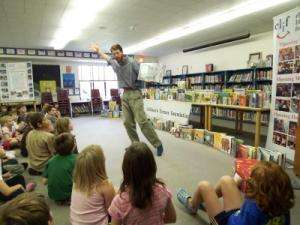Thousands of laid-off business leaders can find fulfilling new jobs by seeking careers in the non-profit world, which is gearing up to respond to rapid growth in demand. In the eleven years since Duncan McDougall quit his successful management consulting career to start the Children's Literacy Foundation he has touched the lives of more than 75,000 rural and at-risk readers across New Hampshire and Vermont.
He reads to kids and gives away children's books wherever they are needed: homeless shelters, low-income housing developments, mobile home parks, prison family visiting rooms, and to refugee, migrant, and low-income children.
He is a case study of one person who has already made the leap from the corporate world to the rewarding world of nonprofits. His move to the nonprofit sector serves as a model for the way business people can fulfill President Obama's call to action to help their fellow citizens.
"Moving to the nonprofit world is one of the best decisions I have ever made," said Duncan. "I get tremendous satisfaction using my business skills to help thousands of kids and families who really need our support, and I feel good knowing I've created five new jobs for me and my staff, and work for 55 Children's Literacy Foundation (CLiF) presenters. Unlike struggling businesses, CLiF continues to grow in this tough economic climate. I look forward to spending the rest of my professional career in the nonprofit world working to inspire more kids."
After completing an Ivy League MBA, Duncan McDougall spent seven years in Boston working as a management consultant. It was an exhausting, exciting, and heady experience. He worked extremely long hours traveling around the world giving marketing advice and trying to improve corporate bottom lines.
The upside? Generous compensation and the opportunity to work on interesting issues such as high tech, telecommunications, and energy. The downside? Endless hours, airport lounges, client sites, and hotel rooms. And not much of a social life.
Duncan eventually realized he wanted to accomplish more with his life than simply helping big companies make more money. But what? He had grown up in a family of readers. One day, while sitting in his office, he asked himself: "What would my life be like if I were not a strong reader or writer?" In his imagination he saw his job, college education, and savings disappear, and most of his opportunities evaporate.
Duncan quit his job in 1997 and moved to a 220-year-old farmhouse in rural New Hampshire. He spent his days traveling the back roads of New Hampshire and Vermont interviewing almost 200 people and learning more about the literacy challenges faced by rural and low-income children in the Twin States. At night by the wood stove he refined his plans for the organization he wanted to start. Duncan's office is now above his garage, he doesn't own a Blackberry, and he doesn't miss life in the fast lane one little bit.
He plans to spend the rest of his career "opening Books, opening Minds, and opening Doors."
To make a donation to CLiF, or to find out more about their programs serving rural and at-risk young readers and writers, you can contact: www.clifonline.org










Be the first to comment